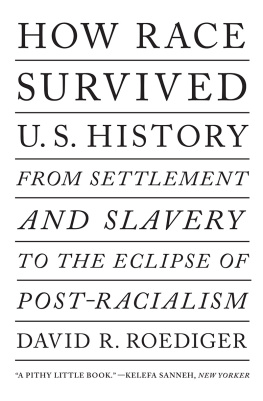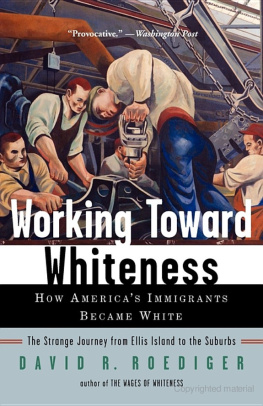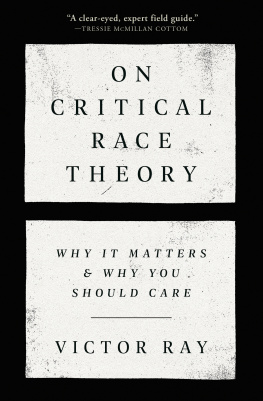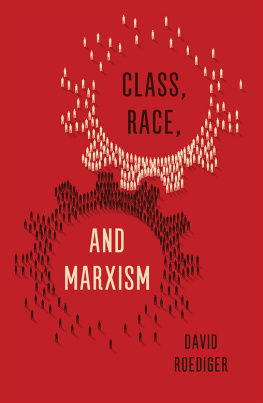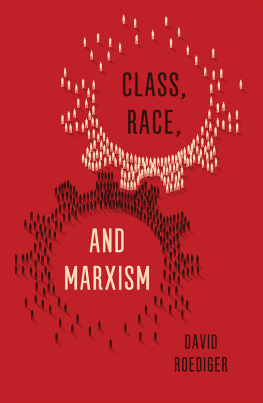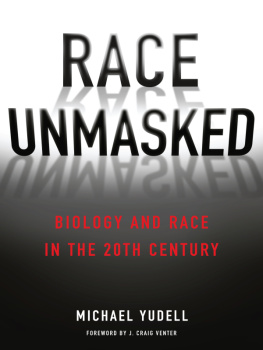Table of Contents

How Race Survived US History
David R. Roediger is the Foundation Distinguished Professor of American Studies and History at the University of Kansas. He is the author of, among other books, The Wages of Whiteness and Towards the Abolition of Whiteness.
How Race Survived
US History

From Settlement and Slavery
to the Eclipse of Post-racialism
DAVID R. ROEDIGER

First published by Verso 2008
David R. Roediger 2008, 2019
This paperback edition published by Verso 2019
All rights reserved
The moral rights of the author have been asserted
1 3 5 7 9 10 8 6 4 2
Verso
UK: 6 Meard Street, London W1F 0EG
USA: 20 Jay Street, Brooklyn, NY 11201
versobooks.com
Verso is the imprint of New Left Books
ISBN-13: 978-1-78873-646-6
ISBN-13: 978-1-78873-701-2 (UK EBK)
ISBN-13: 978-1-78873-702-9 (US EBK)
British Library Cataloguing in Publication Data
A catalogue record for this book is available from the British Library
Library of Congress Cataloging-in-Publication Data
A catalog record for this book is available from the Library of Congress
Contents
The idea of my doing a wildly ambitious and ridiculously short book on race came from Peter Ginna, when he was at Oxford University Press. Although I ended up doing the book neither with him nor with OUP, his persistence in making the case that such a book was possible is responsible for its existence. My editor at Verso, Tom Penn, has been a remarkably enthusiastic supporter even while taking apart the writing line by line. His attention and ideas have vastly improved the final book, as has the assistance of Charles Peyton and Natalie Howe.
My long-standing intellectual debts are many. Almost every chapter of this book leans heavily on the work of W. E. B. Du Bois, whose brilliance I would never have grasped fully without the mentorship of Sterling Stuckey. Alexander Saxton, the leading student of race and class in US history, has been both friend and inspiration, as was the late George Rawick. I knew Michael Rogin too briefly before his death, but the fact that he and Rawick sometimes suggested that I might be on the right track made me a far bolder writer and a happier person. A number of intellectual/political peers have also become teachers in matters central to this book: these include George Lipsitz, Cheryl Harris, Noel Ignatiev, Lisa Lowe, Ruth Wilson Gilmore, Pedro Caban, Peter Linebaugh, and Peter Rachleff.
Two very recently departed fellow workers deserve special mention. Susan Porter Benson allowed me to sit in on her brilliant US history survey lectures at the University of Missouri long ago so that I could learn how to lecture. Each lecture incorporated what would have otherwise seemed to me an impossibly ambitious, simultaneous consideration of race, gender, sexuality and class. The idea that we might tell histories as complicated as real life somehow stuck, although my ability to do so never approached Sues. In writing How Race Survived US History, the thing I most looked forward to was sending a completed version to George Fredrickson, the remarkable historian of comparative race relations with whom I had studied at Northwestern University in Evanston. George died a month before I finished and is greatly missed.
Fellowship support from the Center on Advanced Study at the University of Illinois sped the completion of the manuscript, as did research assistance from Martin Smith and Carmen Thompson. Trying out ideas with students helped me to push arguments further and to avoid at least some mistakes. I am especially grateful for opportunities to deliver recent lectures based on the themes under consideration in this book, at Vanderbilt University, the University of Kentucky, Tulane University, Xavier University, Louisiana State University, the University of Wisconsin-Milwaukee, and Ohio State Universitys Kirwan Institute. One particularly transformational experience was my involvement in the Conference of the Australian Critical Race and White Studies Association, arranged by the great indigenous scholar Aileen Moreton-Robinson.
Those who answered queries, contributed insights, and read parts of the manuscript are too numerous to mention without fear of forgetting some of them. Taking that risk, I want especially to thank Brendan Roediger, Jean OBrien-Kehoe, Clarence Lang, Jennifer Pierce, the late Josephine Fowler, Jean Allman, Poshek Fu, Minkah Makalani, Fred Hoxie, Franklin Rosemont, Paul Garon, Sundiata Cha-Jua, Adrian Burgos, and Elizabeth Esch. The best ideas in the chapter on capitalism and race were thought through in close collaboration with Elizabeth, and some of the material on management and race includes work from an ongoing article that we are coauthoring.
The week in which I finished an early draft of this book featured the first triumph of Obamamania, following Senator Barack Obamas victory in the primary election caucuses in the overwhelmingly white state of Iowa. For all of five days, the manias spread to New Hampshires primaries, if not the nation, looked assured; in the run-up to the primary, polls had Obamas lead stretching comfortably into double digits. Pundits speculated that in one stroke he could knock Hillary Clinton out of the race for the Democratic Party nomination. From George Will and William Bennett on the right, to Andrew Sullivan in the center, to Jesse Jackson on the liberal left, triumphalism reigned, less in support for Obamas still-vague political program but rather because his victory was ours, putting paid to the idea that white racism permeated US politics. Jackson and others noted Obamas special appeal among younger white voters, pronouncing them more comfortably attuned to new multiracial realities, and ready to see Obama as the embodiment of hopes that the nation was moving beyond race.
And then Clinton comfortably won the New Hampshire primary, running as many as seventeen points better than the polls that had predicted her defeat. Some experts dusted off Pew Research Center studies, mostly concerning elections in the 1990s, on the tendency for white voters to have proceeded far enough beyond race to tell pollsters they would support the African American candidate, but not always far enough to actually pull the election booth lever for that candidate, to explain the gap between Obamas polling numbers and the vote. Others saw the gap as the product of a tendency of whites who would usually abstain from voting coming out to cast ballots for a white candidate in the face of a minority candidates possible victory.
Whether either view provides a significant explanation for the results of a very complex open primary among the chronically unpredictable electorate of New Hampshire remains questionable. Obamamania continued to unfold, with fair prospects of success. When the Illinois senators campaign recovered to win in South Carolinas primary, he took 80 percent of the African American vote and 25 percent of the white vote. Despite this, Obama supporters chanted RACE DOESNT MATTER! at his victory celebration in South Carolina, even as the national press, so euphoric a month previously, noted that in no non-caucus state had he exceeded 36 percent of the white vote, and in Democratic primaries at that. But the jarring transition, within less than a month, from positive testimonials for a colorblind future to dissections of a still-lingering white supremacist past, ought to suggest the need for a long view in thinking about race and change. Such a perspective will remind us that insistent proclamations of a new racial day sit uneasily next to patterns of inequality in the present, and not only in the past, as the following salient facts show.

